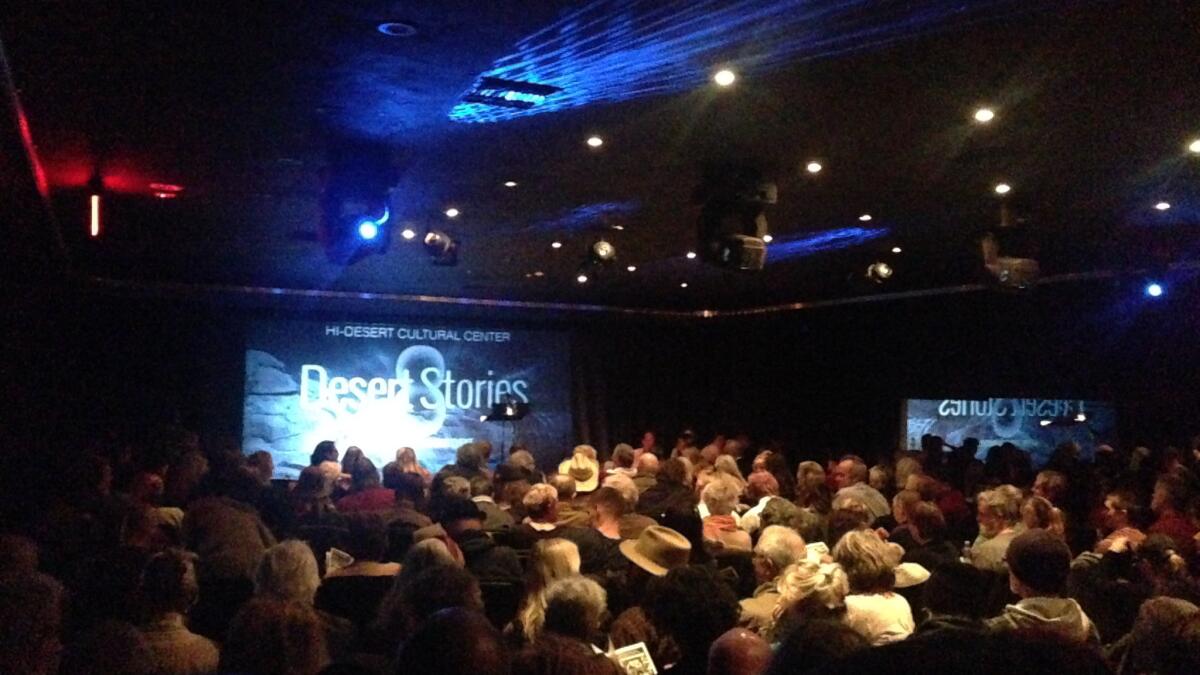A sweet and trippy reading in Joshua Tree

- Share via
In cities like Los Angeles and New York, where so many of our storytellers live, it’s easy to believe we have it all. We have all the languages, all the food, all the culture. We have ocean shores and public parks and mountain views. We are surrounded by humans of every stripe.
But some places are entirely, essentially, different.
Drive 2.5 hours east from Los Angeles and you’ll reach Joshua Tree, which has stark and beautiful landscapes that look like something from another planet. Its national park is filled with boulder piles and spiky Joshua trees. The surrounding desert, which at first glance appears barren, supports a complex ecosystem that features skilled hunters and astonishing spring flowers. The skies go on for days.
Its otherworldliness attracts seekers, like George Van Tassell, a former test pilot and believer in UFOs who built the nearby Integratron. In the 1960s, Joshua Tree was a destination for the Rolling Stones and other bands with hallucinogens in their pockets and transcendence on their minds; Gram Parsons died there (his room, something of a shrine, is the most popular at the Joshua Tree Inn); U2 came along a musical generation later; and so on.
It was inevitable that LSD and mushrooms would play a part in Desert Stories, the eighth annual storytelling event that took place in Joshua Tree Saturday night. Held in the Hi-Desert Cultural Center’s black box theater, the event featured seven readers and two storytelling musicians.
One, Dusty Wakeman, told of how he’d come to buy the Rimrock Ranch when under the influence, literally making a call he didn’t remember the next morning. He and his wife restored and ran the ranch as a rental for 18 years (pre Airbnb). Michel Cicero, managing editor of Ms. Magazine (and my friend), told of a trip in Joshua Tree park that went from transcendent to a little bit scary, as drug experiences often do.
If there’s a way to please a desert audience, it’s to appeal to their sense of beauty. “Did anyone catch the sunset tonight?” asked Susan Cram, a former corporate executive who now runs a Joshua Tree rock climbing company. The applause came quickly -- the sunset had been spectacular.
“I want to thank the Marine Corps for bringing me to this part of the desert,” said Tobias Crabtree before he told his story Moth-style, without notes. He explained he’d trained as a sniper at the nearby Marine base in Twentynine Palms and later returned here to form an intense bond with the natural world, camping on his own for as many as 250 nights a year.
For all the desert’s appeal, however, its desolation means it sometimes is simply the end of the road. “I came to the desert like so many others: because I had no place else to go,” said Stacy Doolittle, a Southern belle turned aerospace worker who has moved to Joshua Tree, where she’s been visited by ghosts.
Many of the stories turned around a sense of discovery or inquiry that seemed only possible in the desert, and the full house murmured in appreciative recognition.
Matt Perry had kicked off the night trying to explain how coming to Joshua Tree was a kind of rebirth for him as a writer. His description of Route 62, which winds from the 10 Freeway through the mountains, as “the birth canal to the high desert” scored a knowing laugh -- the room was full of people who understood the idea but never heard it put quite that way.
Louise Goffin closed the night with a story of heading to the desert for no particular reason; then the daughter of Carole King and Jerry Goffin sang while playing ukulele.
Previous readers at the annual event include Eric Burdon from the Animals, writer Deanne Stillman, Bob Forrest, Ted Quinn, artist Diane Best, author Josh Kun, and Victoria Williams.
“I am not looking for the best writers or the best performers; I grab whoever takes my fancy and ask them if they have a story,” says organizer Cheryl Montelle, who splits her time between the desert and Los Angeles. “Sometimes the participant is a very smart and professional writer or performer and sometimes not, but everyone has a story.”
Many of these stories could never have been generated in an urban center like New York or Los Angeles. It may be that the embrace of nature and lost-and-found-ness and the unexplained can only be truly appreciated when heard right there in Joshua Tree.
Book news and more; I’m @paperhaus on Twitter
More to Read
Sign up for our Book Club newsletter
Get the latest news, events and more from the Los Angeles Times Book Club, and help us get L.A. reading and talking.
You may occasionally receive promotional content from the Los Angeles Times.











